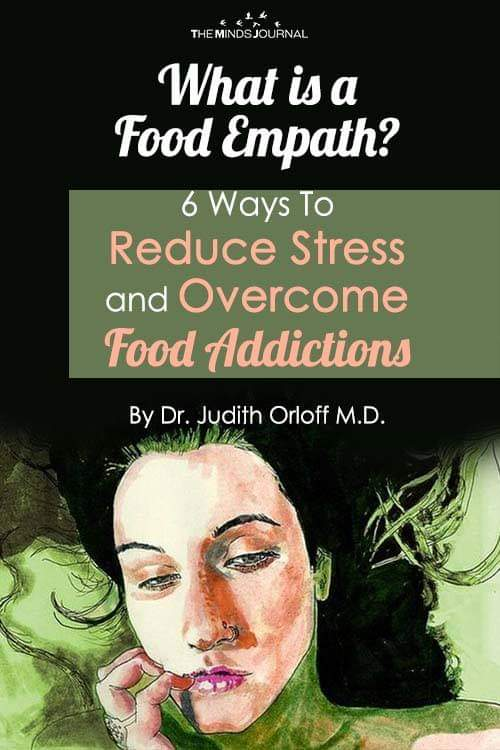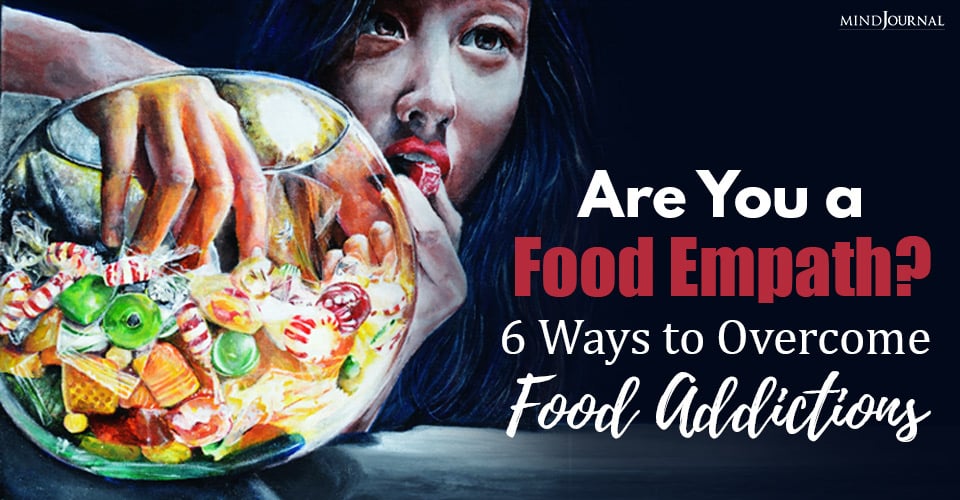Have you ever felt addicted to food, or drawn to bingeing carbohydrates and sugary foods whenever you feel emotionally overwhelmed? Then maybe chances are that you are a food empath.
Food is medicine. It can stabilize your sensitive system, but it can also throw it off.
I’ve observed in my psychiatric practice that overeating and food addictions are common among empaths. Food addiction is an uncontrollable craving for excess food for which many diets and weight loss programs often don’t succeed. Frequently, the specific addiction is to sugar or carbohydrates.
Excess weight can be a way of armoring yourself to stop absorbing other people’s stress or disturbing behavior. Putting on added pounds can make you feel more grounded, and it can act as a buffer against negativity. But reaching for sugar, carbohydrates, or junk foods for a quick fix, is a short-lived and unhealthy solution that gets addictively repeated.
Diets often fail for sensitive people because they are unaware that they are eating (and overeating) unhealthy foods to protect themselves from overwhelming or negative energy.
Related: What Is Your Level of Empathy?
When I point this out to my empath patients who are struggling with overeating, it’s a life-changing insight for them.
Take this quiz to determine if you’re a Food Empath (from The Empath’s Survival Guide).
Are You a Food Empath?
- Do you overeat when you are emotionally overwhelmed?
- Do you turn to sugar, carbs, and junk food to self-soothe discomfort?
- Are you highly sensitive to the effect food has on your body?
- Do you get mood swings, brain fog, or feel toxic from sugar, caffeine, sodas, or junk food?
- Do you have food allergies and intolerances such as to gluten or soy (empath food sensitivity)?
- Do you feel more protected from stress when you are heavy?
- Do you feel energized by healthy, clean food?
- Are you sensitive to preservatives or gluten in food?
- Do you feel more vulnerable to stress when you are thin?
Here’s how to interpret this self-assessment:
- Answering yes to 1-3 statements indicates that have some tendencies toward being a food empath.
- Answering 4-6 yeses indicates you have moderate tendencies to be a food empath.
- Answering more than 6 indicates you are definitely a food empath and use food to self-medicate stress and discomfort.
6 Guidelines for The Empathic Eater
If you are an empathic eater, you will need to pinpoint energetic stressors that trigger overeating such as a draining coworker, an argument with a friend, or feeling rejected. Train yourself to clear the stress as soon as possible to balance your system.
Here are six tips from The Empath’s Survival Guide to release negativity before you overeat.
1. Breathe stress out of your body.
When you feel stress, immediately focus on breathing slowly and deeply. This releases negative energy. Holding your breath out of fear traps toxicity in your body.
Related: 8 Techniques For Reducing Anxiety And Stress Right Now
2. Water purifies you.
Drink filtered or mountain spring bottled water when you’ve been exposed to negative energy and have the urge to overeat. Consume at least six glasses daily to keep flushing out toxins. Take a bath or shower. Water washes away impurities of all kinds.
3. Limit sugar intake.
Although you may crave carbs and sugar (as well as alcohol), they will destabilize you and trigger mood swings. This makes you more susceptible to absorbing unwanted energy.
4. Eat frequent protein meals.
Protein stabilizes empaths and gives them a sense of grounding. It’s optimal to have small protein meals four to seven times a day. This regimen will help you feel energetically stronger, safer, and more anchored in the world. (If you are vegan, lots of protein is crucial.)
5. Don’t let your blood sugar drop.
Empaths are extremely sensitive to hypoglycemia. If you combine a busy life with low blood sugar, you’re bound to get overwhelmed. So don’t skip meals, especially if you are planning to be in a crowded place, when traveling, or in business meetings.
6. Consume lots of vegetables.
If you tend to overeat and gain weight, vegetables will fill you up and limit your cravings. Vegetables are grounding foods for empaths. You can also include some whole grains, but be careful of overdoing it and triggering a carb addiction.
Related: 8 Signs You’re A Highly Intuitive Empath Sensitive To Energy
Food can be a source of energy or depletion. You want to develop dietary habits that serve your sensitivities rather than aggravating them. Then you can maximize the energy you receive from food and minimize the protective defense mechanism of empathic over-eating. With tools to protect and ground yourself, you won’t have the same cravings that used to undermine your best intentions.
Adapted from “The Empath’s Survival Guide” by Judith Orloff MD
Written by Dr. Judith Orloff MD










Leave a Reply